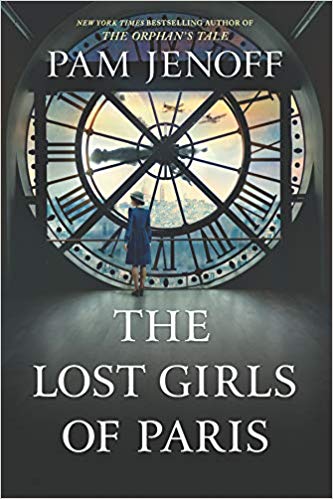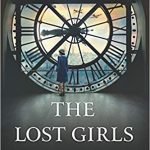 The Lost Girls of Paris by Pam Jenoff
The Lost Girls of Paris by Pam Jenoff Format: eARC
Source: supplied by publisher via Edelweiss
Formats available: hardcover, paperback, large print, ebook, audiobook
Genres: historical fiction
Pages: 384
Published by Park Row on January 29, 2019
Purchasing Info: Author's Website, Publisher's Website, Amazon, Barnes & Noble, Kobo, Bookshop.org
Goodreads
From the author of the runaway bestseller The Orphan’s Tale comes a remarkable story of friendship and courage centered around three women and a ring of female spies during World War II.
1946, Manhattan
Grace Healey is rebuilding her life after losing her husband during the war. One morning while passing through Grand Central Terminal on her way to work, she finds an abandoned suitcase tucked beneath a bench. Unable to resist her own curiosity, Grace opens the suitcase, where she discovers a dozen photographs—each of a different woman. In a moment of impulse, Grace takes the photographs and quickly leaves the station.
Grace soon learns that the suitcase belonged to a woman named Eleanor Trigg, leader of a ring of female secret agents who were deployed out of London during the war. Twelve of these women were sent to Occupied Europe as couriers and radio operators to aid the resistance, but they never returned home, their fates a mystery. Setting out to learn the truth behind the women in the photographs, Grace finds herself drawn to a young mother turned agent named Marie, whose daring mission overseas reveals a remarkable story of friendship, valor and betrayal.
Vividly rendered and inspired by true events, New York Times bestselling author Pam Jenoff shines a light on the incredible heroics of the brave women of the war, and weaves a mesmerizing tale of courage, sisterhood and the great strength of women to survive in the hardest of circumstances
My Review:
The story told in The Lost Girls of Paris is absolutely fascinating, all the more so for being rooted in history.
In some ways it’s a lot like the nonfiction stories in Hidden Figures, Code Girls, and other books that have brought the hidden contributions of women to recent events in history out of the shadows and into the light.
During World War II, women stepped up to do all the jobs that used to be reserved for men before the war, because there were few men left at the homefront. This was true in the U.S. and it was especially true in Britain and France as men were either in the armed services, conscripted into labor camps in France, or dead.
As the Allied forces prepared for what we now know as D-Day, the Allies needed the French Resistance to step up their sabotage and misinformation efforts. War is, as always, a very dirty business.
When it became nearly impossible to place any more male agents in France, the Special Operations Executive created a women’s section, run by Eleanor Trigg (based on real-life SOE Officer Vera Atkins), to place female agents in France. By that point, there were so few young, able-bodied men around that male agents were unmasked almost as soon as they hit the ground.
It was hoped that women would be able to blend into the remaining population. They were trained to do the dirty work needed to bring that hoped for invasion to fruition – even if they didn’t personally live to see it.
The story of The Lost Girls of Paris is about those female British agents, and the story is told from three perspectives. Eleanor Trigg, the creator of the women’s section, the designer of their training and the person who chose each and every woman who entered the program; Marie Roux, one of the women she recruited who went to France in those dark days, and Grace Healey, a young widow in the immediate aftermath of the war, who discovers a suitcase full of photographs under a bench in New York’s Union Station, and finds herself drawn into a quest to reveal the truth.
Not just the truth of what those women endured, but the truth about their betrayal by their own government – and that same government’s willingness to bury their history along with their bodies – whether their actual corpses can ever be found – or not.
Escape Rating B+: I have mixed feelings about this book. The story it tells is both compelling and harrowing, but some parts more than others.
I found Eleanor Trigg to be a fascinating character. (She reminds me a bit of the character of Hilda Pierce in Foyle’s War – a woman who also served in the SOE.) A Jewish refugee from Poland, Eleanor and her mother have reinvented themselves as Englishwomen – but Eleanor is never quite accepted as “one of us” by the government bureaucracy – or its bureaucrats.
She began as a secretary to the Director of the SOE, became his unofficial right hand, and then the chief of the women’s section – only to be unceremoniously discarded even before the end of the war – and set up to be a scapegoat for the dirty deeds done by her agents on behalf of the government and by the government TO her unsuspecting agents.
Eleanor seems like a one-woman representative of all the ways that women were distrusted, disrespected, successful in spite of systemic misogyny, and then betrayed and discarded when they were no longer needed.
Grace’s perspective from the post-War United States is a reflection of that misogyny and betrayal. Her husband died in an auto accident before he deployed, leaving her a widow but not exactly a war widow. She comes to New York City searching for work and purpose in a country that wants all its women to go back to home and hearth and pop out babies. But the soldier who should have returned to her after the war can’t, and she’s not ready to move on.
Putting herself into the middle of Eleanor’s search for truth gives her purpose and new life. As someone who was not a part of the original events, she is both an unimpeachable witness and empathetic searcher.
I’ll admit that I had problems with Marie. The parts of the story that covered her recruitment and training were absorbing – and the story of her capture and torture were harrowing beyond belief, but I stopped being interested in her as a character when she got captured. Not because she was captured, but because of the way it happened. She literally brought it on herself by being TSTL (too stupid to live). Her capture and subsequent torture became inevitable – when they shouldn’t have been. Many of the female agents were captured, tortured and killed through betrayal, bad luck or just circumstance. It wasn’t necessary for Marie to be a fool for love to show the terrible fate of so many of these brave women. For this reader, the spark of romance in this part of the story was unnecessary and detracted from their courage and sacrifice.
On my other hand or hands, the entire story is compelling from beginning to end. I finished it in one day and could not put it down – although I had to pause at points while Marie was being tortured. Those parts of the story are not for the faint of heart – but they are an important part of the story all the same.
~~~~~~ GIVEAWAY ~~~~~~
I am giving away a copy of The Lost Girls of Paris to one lucky US commenter on this tour!





















I enjoy reading almost all genres in Historical Fiction. The WWII era, Scottish Highlands and Regency London to name a few.
My favorite era is World War 11 since it is meaningful, important and memorable.
I like all historical stories. Love learning about the different eras. My favorites are Victorian, Regency, 1940’s and the old west.
Turn of the century to WWI is one favorite, also ancient England and Europe. Thanks!
I don’t really have a favorite, but am drawn to mysteries set in the Regency and medieval/Tudor periods.
My favorite time periods are the WWI and WWII times.
I love World War ll books! Thank you
World War II books are always fun to read! Thank you for being on this tour!
Sara @ TLC Book Tours
WWII Is actually one of my favorites. I have also discovered a couple WW1 books, which is a period I don’t know as much about.
1700
I like the Elizabethan time period.
Ken Follett’s depiction of the World Wars is excellent!
I love reading any time period but I like m.l.k. books and Viet nam.
I like the Victorian era and mid 1950s to 1960s
Enjoyed this book so much. Loved the strong female characters. However, the mention of “the seals of all fifty states” when describing The Willard Hotel was baffling since it was supposed to be 1946. (Page 189)